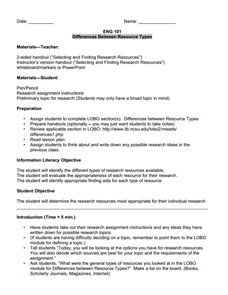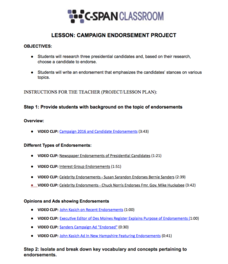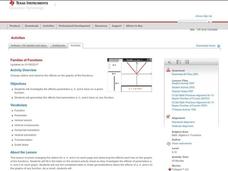University of Minnesota
WebQuest: Structure of the Nervous System
What could be more natural than learning about learning? Scholars research the central nervous systems and the learning process through a well-designed WebQuest. They study the structure as well as discover the functions of those...
Nature Works Everywhere
Sharks and Shorelines
Examine predator-prey marine relationships through an interactive lesson design. Learners begin by studying a specific shark species and then analyze real-time shark-tracking data. They also study threats to shark populations and...
NASA
Revising an Investigation
Write, edit, and then revise! The fourth lesson in a five-part series asks peers to provide feedback on research. Individuals then use the research to edit and revise conclusions and develop their presentations.
PBS
Compare State Voting Laws Today with Laws of the Jim Crow Era
Georgia's law S.B. 202 is at the center of a lesson that asks young scholars to examine what critics say are Georgia's attempts to limit voting access to Black voters. Groups then investigate the voting laws in their own state, as well...
PBS
Jackie Robinson's Complicated — and Important — Legacy
Americans tend to lock their heroes in history, holding these icons to a particular event or time. Jackie Robinson is such a hero, remembered by most for becoming the first African American to play in the Major Leagues. Young historians...
Overcoming Obstacles
Speaking
Words! Words have meaning and power, and using them leads to consequences. The activities in this lesson are designed to remind participants to choose their words wisely when they speak.
Curated OER
Differences Between Resource Types
Google it! Like Kleenix, Google has genericized. But when beginning a project, young researchers need to go beyond search engines and become aware of the different types of research resources available. Introduce the options with a...
Curated OER
Estuary and Watershed
High schoolers investigate the San Francisco Bay Estuarine Research Reserve and watershed. In this estuary and watershed lesson plan, students complete 4 activities to better understand estuarine systems. They include studying the San...
Curated OER
Biodiversity in an Estuary
Young scholars investigate the biodiversity in estuaries. In this estuary lesson plan, students use Google Earth to explore the Rookery Bay National Estuarine Research Reserve. They produce a biodiversity concept map and portray the life...
Google
History of Math Lesson Plan
Learners honor mathematicians who have contributed important discoveries throughout history by researching and creating a report about a famous mathematician and their contributions to the history of mathematics. Pairs of learners create...
Curated OER
A Full Load
Students calculate the shipping costs between two destinations. In this math lesson, students determine the distance between two places using google map. They calculate the amount of gas needed to get to a specific destination.
C-SPAN
Presidential Birth Requirement
Every president of the United States must be a natural-born citizen, but the definition of natural-born is not as straightforward as it seems. Secondary scholars examine two points of view surrounding the constitutional requirement and...
Curated OER
Migration of the Neo-Tropical Songbirds
Fifth graders plot the migration of birds using Google Earth. In this lesson on bird migration, 5th graders work in groups to plot the migration of a group of birds using Google Earth. Students present and discuss their findings and look...
Curated OER
Snow Goggles And Limiting Sunlight
Students build snow goggles similar to those used by the Inuit people. They create their version of the goggles to improve upon existing designs. Pupils compare the process used to invent snow goggles with that employed by the MESSENGER...
Curated OER
Lunar Field Trip
Students take a virtual tour on Google Moon of what human life would be like on the moon. In this moon lesson plan, students also compose web diagrams, make charts, make a time line, investigate problems, and more.
Code.org
What is Big Data?
Find out why Big Data is a big deal in the first installment of a 12-part unit that introduces young computer scientists to Big Data and demonstrates how it is useful. In pairs, class members research a big data tool to uncover the...
C-SPAN
Campaign Endorsement Project
So many politicians, so many endorsements! Learn to differentiate between facts as well as the process of endorsements with an informative resource. Class members watch current endorsement videos, research candidates from three different...
Middle Tennessee State University
Preparing for Revolution
Class members create a timeline of actions by both the British parliament and the colonists that led to the outbreak of the American Revolution. Groups use the provided Primary Source Analysis Tool to examine and evaluate materials to...
Curated OER
Families of Functions
Learners use sliders to change the parameters of functions and examine how shifting parameters affects a graph. They identify the parameters of functions, find vertical and horizontal stretches, then calculate the scale factor and other...
Google
Advanced 5: Evaluating Credibility of Sources
How do discerning readers determine bias and credibility? Ask small groups to figure it out! First, each group is provided with either articles or videos that contain bias. They examine the resources, respond to included questions, and...
Center for Civic Education
Lesson 1: Who Can Vote in the United States?
The purpose of this first lesson in a series of five about enfranchisement and suffrage is to determine what class members already know, or think they know, about voting and voter registration. Groups answer questions on the provided...
Center for Civic Education
Lesson 2: Suffrage Amendments
Youngsters examine selected amendments to the Constitution to determine how voting requirements in the US have changed from the colonial days to the present.
Center for Civic Education
Lesson 3: Becoming a Voter
Who is eligible to vote in your state? Class members examine their states' voting qualifications, complete sample voter registration forms, and chart the elections scheduled.
Google
Beginner 2: Understanding Search Results
Once you've entered effective search terms, how do you evaluate the results of your search? Through the presentation and activities included here, pupils will examine results pages and determine what guiding information is provided. By...

























